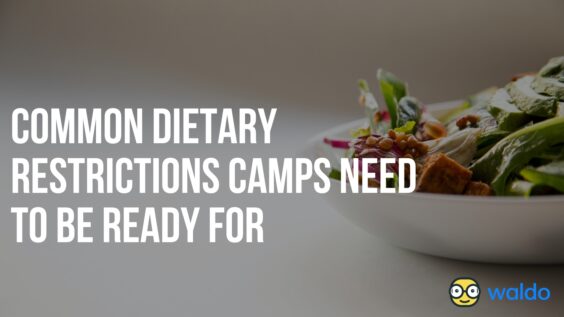
One of the best parts of summer camp is the delicious food!
If you’re tasked with planning the menu for your next camp, it can quickly feel overwhelming. With many mouths to feed, dealing with picky eaters, and the preparation time and cost for meals, creating a menu that satisfies all your campers can be challenging. On top of these hurdles, there are common dietary restrictions and food allergies to take into consideration as well.
While creating your camp menu, you may find yourself not knowing which foods to avoid or prepare alternatives for. Don’t worry – we’re here to help with this! We have compiled a brief description of several common dietary restrictions to consider and prepare for when creating your camp menu. We hope you find this compilation helpful while planning your next camp menu.
Common Dietary Restrictions
Gluten-Free
Individuals who have celiac disease, an autoimmune disease that damages the lining of the small intestine, are instructed to stay away from gluten. Celiac disease is a medical condition that worsens with gluten. People generally stick to a gluten-free diet if they have celiac disease, but it’s also common for individuals who have gluten sensitivity or want a healthier diet.
What is a gluten-free diet?
Following a gluten-free diet requires careful attention to food and its ingredients.
Having a gluten-free diet requires additional planning and prepping when it comes to food choices. Many foods contain gluten, such as wheat products, barley, and rye. Educating yourself about gluten and knowing which foods to avoid is important for creating a gluten-free menu for those with gluten restrictions.
What are common foods that contain gluten?
- Bread
- Pastas
- Hot dogs
- Cookies
- French fries
It’s very important to avoid cross-contamination when preparing gluten-free foods, especially for those with celiac disease.
Avoid cross-contamination:
- Store foods containing gluten in a separate container from those with gluten.
- Wash your hands, cooking utensils, and common surfaces well before preparing gluten-free products.
- Consider using different appliances and utensils, even after washing.
Vegetarian/Vegan
People often opt for a vegetarian or vegan diet due to health concerns, environmental activism, religious, or personal beliefs. While the vegetarian and vegan diets are similar, there are some differences.
What is the difference between a vegetarian and a vegan diet?
Vegetarian diets do not eat meat, poultry, or fish. Vegan diets are stricter than vegetarian. Individuals who are vegan do not consume meat, poultry, fish, or products that come from animals.
What foods do the vegetarian and vegan diets avoid?
There are many foods and ingredients that vegetarians and vegans choose not to consume.
Vegetarians avoid:
- Meat
- Poultry
- Fish
Vegans avoid:
- Meat
- Poultry
- Fish
- Eggs
- Dairy products
- Gelatin
- Honey
How to ensure proper nutrition?
Eliminating meat from a vegetarian diet or eliminating meat and animal products from a vegan diet can make it difficult to ensure proper nutrition. The more foods that are eliminated, the more challenging it is to have a nutritious diet due to the restrictions. Substitutions such as tofu, nuts, and beans are good protein sources for vegetarians and vegans.
Being flexible when it comes to the camp menu and having food alternatives for your campers with vegetarian or vegan diets is important.
Dairy Free
Individuals commonly follow a dairy-free diet for health reasons such as lactose intolerance or personal preferences.
What is lactose intolerance?
People who are lactose intolerant avoid dairy products because their bodies cannot properly digest the lactose found in milk. Consuming milk while lactose intolerant causes discomfort and stomach pain.
What is a dairy-free diet?
There are several reasons besides being lactose intolerant that would compel someone to follow a dairy-free diet. In simple terms, a dairy-free diet consists of foods and beverages that do not contain dairy in any way.
What foods to avoid with a dairy-free diet?
- Cows milk, as well as milk from other animals
- Cheese
- Ice cream
- Yogurt
What are good alternatives?
Fortunately, there are alternatives and substitutes for dairy products. Soy, almond, banana, coconut, and rice milk are alternatives for dairy milk. As the food industry progresses, more options are available for dairy-free products.
Common Food Allergies
While your campers may not have entire diet restrictions, food allergies are common. It’s essential to be aware of common food allergies, inform your campers, and ensure they don’t have food allergies.
We recommend knowing your campers’ food allergies before they arrive at camp. This ensures you have time to adjust your camp menu and look out for allergies. When serving foods containing common allergens, we recommend clearly informing your campers of the key ingredients.
Common food allergies consist of:
- Nuts
- Eggs
- Shellfish
- Soy
Wrap Up
When preparing your menu, it can be challenging to accommodate everyone’s food preferences, dietary restrictions, and food allergies. When individuals register for your camp, we strongly recommend implementing a section where they specify their dietary restrictions. By adding this critical section to the registration process, you will save yourself a lot of time and have the ability to prepare your camp menu accordingly.
Looking for an easy way to share camp photos with camper families at home? WaldoCamps by Waldo Photos makes sharing photos simple with automated mobile photo delivery.